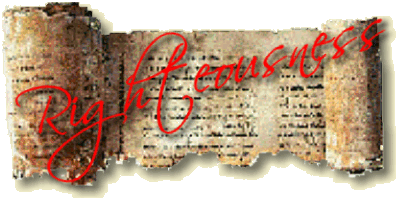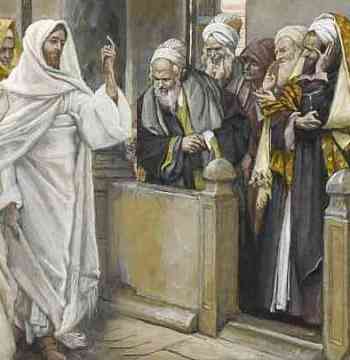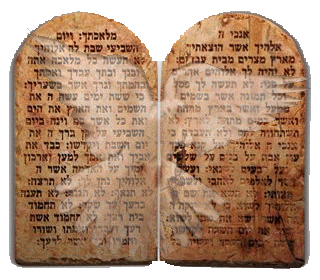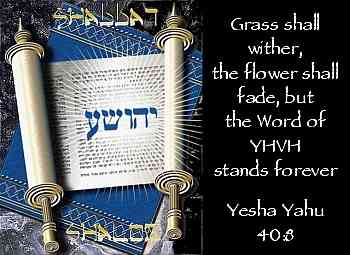
|
by haRold Smith
a citizen of the Commonwealth
(Ephesians 2:12)
"For YHVH has done what the law, weakened by the flesh, could not do. By sending his own Son in the likeness of sinful flesh and for sin, he condemned sin in the flesh, in order that the righteous requirement of the law might be fulfilled in us, who walk not according to the flesh but according to the Spirit. For those who live according to the flesh set their minds on the things of the flesh, but those who live according to the Spirit set their minds on the things of the Spirit." Romans 8:3-5
"Then Yeshua came from Galilee to the Jordan to John, to be baptized by him. John would have prevented him, saying, 'I need to be baptized by you, and do you come to me?' But Jesus answered him, 'Let it be so now, for thus it is fitting for US to fulfill all righteousness.' Then he consented." Matthew 3:13-15
"Little children, let no one deceive you. Whoever practices righteousness is righteous, as He is righteous." 1John 3:7
What is "Righteousness"? What does it mean to be "Righteous"? How is Righteousness "fulfilled" in us? Whenever this type of question is posed, most of us give an automatic response by saying to be righteous means to be in "right standing with God." But when we are asked, "What does it mean to be in right standing?" we are left groping for an appropriate answer to a question we have never really considered before. Yeshua said that when we simply accept tradition as Truth, we nullify, we bring to "none effect" the Power of the Living Torah (Word - click on highlighted verse to see scripture), in our lives (Mark 7:13). So much tradition has become intermingled with what we believe we are scarcely aware of its effects upon our lives (see Prayer & Healing and Arrows of Famine). So much of the internal struggles we encounter in our personal lives can be pre-empted simply by coming to an understanding of the Truth that is conveyed in the Words given to us.
The Righteousness spoken of in scripture originates from the Hebrew word tsedaqah derived from Isaiah 33:14-16 and its definition means rectitude, virtue and justice in behavior. In the Greek, righteousness is translated from the word dikaiosyne, meaning integrity, virtue, purity of life, rightness, correctness of thinking, feeling and acting, the condition acceptable to YHVH. We see in these definitions from both the Hebrew and the Greek that righteousness is synonymous with virtue. The Greek word for Virtue is dynamis and means inherent power, power residing in a thing by virtue of its nature. It is from this Greek word dynamis are derived the English words dynamic and dynamo. In several places of scripture we see the Power flowing from Yeshua's Life that healed and delivered from bondage credited to the Virtue, the purity, the excellence of Spirit that dynamo produced within Him (Mark 5:30, Luke 6:19). The virtue He embraced and lived out before us is the example of the manner of behavior by which we also acquire that same Virtue. Righteousness is a virtuous state of being that allows us to come into the Presence of the Father without being consumed (see the Glory). The Most Virtuous state of Righteousness is Who YHVH declares Himself to be.

|
Righteousness is a choice we make in our manner of behavior as an act of our will. Virtue (righteousness) is not something that "falls" upon us simply because we mouth some words. Virtue is cultivated in our life by our actions - as it was in Yeshua's life (Hebrews 5:8, Hebrews 12:11). What Yeshua did by His sacrifice was not to relieve us of any further action on our part, but to open the door of empowerment to us through which we might be able to fulfill the righteousness required of the law, the Torah, and thus be able to stand in the Presence of YHVH prior to which the weakness of the flesh had prevented us from accomplishing. The Power He has given us is found in being immersed in ruach hakodesh (Hebrew, the spirit of holiness - Luke 3:16, Acts 1:8). The Greek word for Power in John 1:12 is ecksousia - the power of choice (see Authority). Just because the door is open does not mean that what lies beyond is automatically attained. We still have to make the choice to walk through that door and then to embrace what is on the other side. The scripture says we are to be clothed in righteousness - which means we must put it on like a garment (Isaiah 59:17, Ephesians 6:13-18). The clothes you are wearing today did not leap out of the closet onto your body just because you opened the door. You had to make a conscious, deliberate act to pass through the door to acquire them and to then to "put them on" (Matthew 5:6). We make a sacrifice of righteousness by doing something our fleshly desires would not ordinarily propel us to choose to do (Psalm 4:5). We exercise our power of choice on a daily basis in choosing to put on a garment of righteousness in our manner of behavior in every circumstance that confronts us. We put on the Life Yeshua exhibited and, in so doing, we satisfy the requirements of the law of righteousness - thus "fulfilling" the law. We do not proclaim faith IN the Messiah to become righteous - we exhibit the manner of the faith OF the Messiah (Galatians 2:20, Philippians 3:9). The faith OF the Messiah was the same as the faith OF Abraham. They both heard the voice of the Father speak and they exhibited their belief that He would accomplish what He said He would do with their subsequent ACTIONS of obedience BY their behavior. It was the faith demonstrated BY their actions that was accounted to them as righteousness (see To Believe).
To those who would say they are not "under the law", I would submit to you that when you choose to not entertain sexual lust in your heart - you are fulfilling the requirement of "the law" to not commit adultery (Exodus 20:14, Matthew 5:28); when you make a choice to forgive rather than to hate your brother, you are fulfilling the requirement of "the law" to not murder (Exodus 20:13, 1John 3:15); when you choose to content yourself with what the Father has given you and do not practice covetousness, you are fulfilling the requirement of the law to not practice idolatry (Exodus 20:3, Mark 7:21-23); and so on and so on. When you choose to fashion the manner of your life after Yeshua's (which is the definition of the Greek word akoloutheo translated as the English "follow"), you fulfill the Essence of the Character of YHVH in selflessness. By patterning your life after Yeshua's example, you are fulfilling the fundamental element each of the ordinances contained in "the law" requires - which is to look upon the things of your brother as more important than the things of your own (Philippians 2:4). Yeshua said ALL of the law and the prophets HANG on these two commandments (Matthew 22:37-40). He was saying that IF you embrace the Essence of these two in all your manner of being - all of the others will be kept because all of the others are rooted in the same selflessness found in these two. It is a STATE OF BEING that the law requires of us. Everything given to us from both sides of the Book is an attempt to illustrate how that STATE OF BEING is personified. He does NOT say that everything the Father was attempting to illustrate about His Essence, that State of Being, prior to that statement has now been made non-existent (Matthew 5:17-20, see the law of 100%).

|
Yeshua did not bring anything new to the table. All of His exhortation was given to point us to the Father. He never once said to pray to Him (Yeshua). Yeshua said to pray to the Father. He said we could ask in His Name and the Father would honor it, but He didn't say to pray to Him - He said to ask of the Father IN His Name (see what it means to be In His Name). Every epistle written by His Followers in brit hadashah (the NT) begins with an acknowledgement of first the Father and then, subsequently, the Son. They understood that everything Yeshua said and did begins with YHVH and is found throughout the pages of the original Book. By aligning our deeds in the same manner as He did, by fashioning our life after those admonitions given to us in Torah, our actions can then be measured against the Life He led among us as an example of how we are to BE acceptable, to BE righteous in order to come into the Presence of YHVH. Yeshua said He is "the Way, the Truth and the Life: no man comes to the Father except by Me" (John 14:6). Framed another way, that thought can also be stated, My Life is the only Way Truth (TORAH) is exampled and no man can find any Way to the Truth of the Father except by incorporating the Virtue found in the example of My Life into his own. To embrace the tradition of men that says the 85% of the Revealed Essence of the Father in the Original Book is no longer relevant diminishes the fulfillment of His standing, His righteousness within us, and, thus, the Power associated with that standing. Whether it be from what has been handed down as religious tradition or tradition in secular realms, the embrace of the tradition of men renders the Power of the Living Word void in our lives - it makes us impotent (Mark 7:13). It is because we have been lulled into numbness regarding instruction of what is righteousness that we see spirits of licentiousness, covetousness and falsehood running amok among those who profess to be believers. Balancing scripture means not discarding or dismissing anything but, instead, to look at how the entirety of what we have been given is interwoven into the Essence of the Nature and Character of this One True Elohim who never changes, never wavers, never casts a shadow of turning and is expressed by the Life of the One Whom He Sent (2Timothy 2:13, James 1:16-18, Malachi 3:6).

|
There is no Hebrew or Greek word for "right standing". To rightly stand in His Presence means to become as He is - Light. To stand in His Presence means to walk uprightly. Uprightly comes from the Hebrew word tamiym which means complete, whole, entire, and sound. Interestingly, of the 91 times this word tamiym appears in scripture, it is translated as "uprightly" only eight times. An overwhelming majority of times, tamiym is translated "without blemish" (44 times) and "perfect" (18 times). Of these 91 appearances, only once does it show up in the New Testament (Galatians 2:14). So, when we speak of being in "right standing with God", just know that the instruction, the description of what it means to "walk rightly" before the Father is found in the Original Book of instruction. The Greek word for "fulfill" in the scriptures at the top of this article is pleroo (pronounced ple-rue-o) and means to render full, i.e. to complete, to fill to the top: so that nothing shall be wanting, unto full measure, fill to the brim (see the Law of 100%); To walk uprightly before the Father means to fulfill the requirement of the law, to be complete in righteousness.
| "And the effect of righteousness will be peace and the result of righteousness, quietness and trust forever." Isaiah 32:17 |
Please feel free to email me at harold@hethathasanear.com. While not claiming to have all the answers, it would be an honor to partake with you of what the Spirit is uncovering.